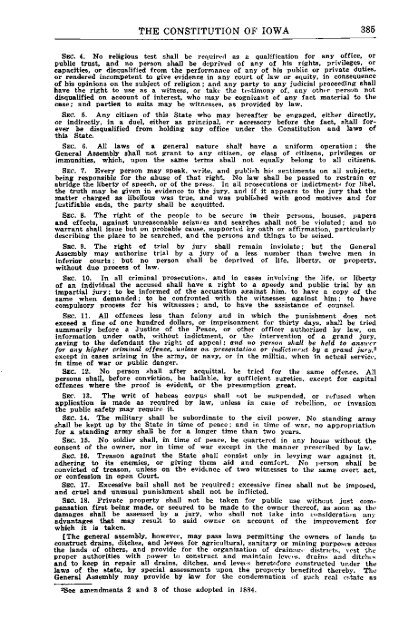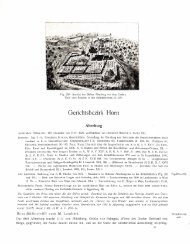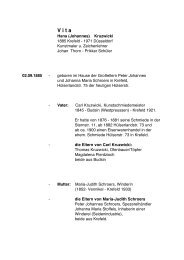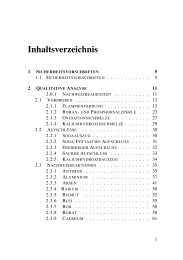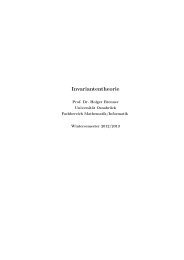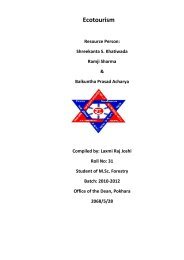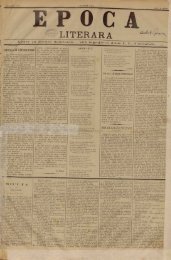(51GA).pdf - wikimedia.org
(51GA).pdf - wikimedia.org
(51GA).pdf - wikimedia.org
Create successful ePaper yourself
Turn your PDF publications into a flip-book with our unique Google optimized e-Paper software.
THE CONSTITUTION OF IOWA 385<br />
SEC. 4. No religious test shall be required as a qualification for any office, or<br />
public trust, and no person shall be deprived of any of his rights, privileges, or<br />
capacities, or disqualified from the performance of any of his public or private duties,<br />
or rendered incompetent to give evidence in any court of law or equity, in consequence<br />
of his opinions on the subject of religion ; and any party to any judicial proceeding Bhall<br />
have the right to use as a witness, or take the testimony of, any other person not<br />
disqualified on account of interest, who may be cognizant of any fact material to the<br />
case; and parties! to suits may be witnesses, as provided by law.<br />
SEC. 5. Any citizen of this State who may hereafter be engaged, either directly,<br />
or indirectly, in a duel, either as principal, or accessory before the fact, shall forever<br />
be disqualified from holding any office under the Constitution and laws of<br />
this State.<br />
SEC. 6. All laws of a general nature shall have a uniform operation ; the<br />
General Assembly shall not grant to any citizen, or class of citizens, privileges or<br />
immunities, which, upon the same terms shall not equally belong to all citizens.<br />
SEC. 7. Every person may speak, write, and publish his sentiments on all subjects,<br />
being responsible for the abuse of that right. No law shall be passed to restrain or<br />
abridge the liberty of speech, or of the press. In all prosecutions or indictments for libel,<br />
the truth may be given in evidence to the jury, and if it appears to the jury that the<br />
matter charged as libellous was true, and was published with good motives and for<br />
justifiable ends, the party shall be acquitted.<br />
SEC. 8. The right of the people to be secure in their persons, houses, papers<br />
and effects, against unreasonable seizures and searches shall not be violated; and no<br />
warrant shall issue but on probable cause, supported by oath or affirmation, particularly<br />
describing the place to be searched, and the persons and things to be seized.<br />
SEC. 9. The right of trial by jury shall remain inviolate; but the General<br />
Assembly may authorize trial by a jury of a less number than twelve men in<br />
inferior courts; but no person shall be deprived of life, liberty, or property,<br />
without due process of law.<br />
SEC. 10. In all criminal prosecutions, and in cases involving the life, or liberty<br />
of an individual the accused shall have a right to a speedy and public trial by an<br />
impartial jury; to be informed of the accusation against him, to have a copy of the<br />
same when demanded; to be confronted with the witnesses against him; to have<br />
compulsory process for his witnesses; and, to have the assistance of counsel.<br />
SEC. 11. All offences less than felony and in which the punishment does not<br />
exceed a fine of one hundred dollars, or imprisonment for thirty days, shall be tried<br />
summarily before a Justice of the Peace, or other officer authorized by law, on<br />
information under oath, without indictment, or the intervention of a grand jury,<br />
saving to the defendant the right of appeal; and no person shall be held to answer<br />
for any higher criminal offence, unless on presentation or indictment by a grand jury, 2<br />
except in cases arising in the army, or navy, or in the militia, when in actual service,<br />
in time of war or public danger.<br />
SEC. 12. No person shall after acquittal, be tried for the same offence. All<br />
persons shall, before conviction, be bailable, by sufficient sureties, except for capital<br />
offences where the proof is evident, or the presumption great.<br />
SEC. 13. The writ of habeas corpus shall not be suspended, or refused when<br />
application is made as required by law, unless in case of rebellion, or invasion<br />
the public safety may require it.<br />
SEC. 14. The military shall be subordinate to the civil power. No standing army<br />
shall be kept up by the State in time of peace; and in time of war, no appropriation<br />
for a standing army shall be for a longer time than two years.<br />
SEC. 15. No soldier shall, in time of peace, be quartered in any house without the<br />
consent of the owner, nor in time of war except in the manner prescribed by law.<br />
SEC. 16. Treason against the State shall consist only in levying war against it,<br />
adhering to its enemies, or giving them aid and comfort. No person shall be<br />
convicted of treason, unless on the evidence of two witnesses to the same overt act,<br />
or confession in open Court.<br />
SEC. 17. Excessive bail shall not be required; excessive fines shall not be imposed,<br />
and cruel and unusual punishment shall not be inflicted.<br />
SEC. 18. Private property shall not be taken for public use without just compensation<br />
first being made, or secured to be made to the owner thereof, as soon as the<br />
damages shall be assessed by a jury, who shall not take into consideration any<br />
advantages that may result to said owner on account of the improvement for<br />
which it is taken.<br />
[The general assembly, however, may pass laws permitting the owners of lands to<br />
construct drains, ditches, and levees for agricultural, sanitary or mining purposes across<br />
the lands of others, and provide for the <strong>org</strong>anization of drainage districts, vest the<br />
proper authorities with power to construct and maintain levees, drains and ditches<br />
and to keep in repair all drains, ditches, and levees heretofore constructed under the<br />
laws of the state, by special assessments upon the property benefited thereby. The<br />
General Assembly may provide by law for the condemnation of such real estate as<br />
2 See amendments 2 and 3 of those adopted in 1884.


